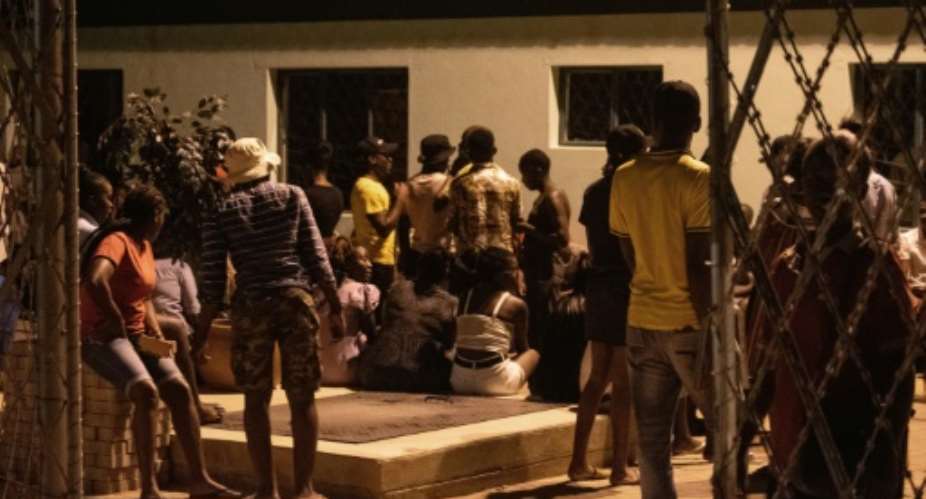Vote counting was underway in Namibia on Thursday after polling ran on late into the night in a general election expected to losen the ruling party's hold on power.
Namibians went to the polls on Wednesday to elect a president and lawmakers after years of economic hardship and a recent corruption scandal that have stirred up resentment against the government.
President Hage Geingob's South West Africa People's (SWAPO) party has ruled the southwest African country since independence from South Africa in 1990.
While the party still basks in the legacy of the liberation struggle, Geingob is predicted to lose votes to a SWAPO member running as an independent candidate, ex-dentist Panduleni Itula.
The breakaway candidate is particularly popular among youth frustrated by the lack of jobs and too young to remember the SWAPO-lead war for independence.
The electoral commission has refused to say by when provisional results will be released.
But in the last election in 2014, provisional results were announced one day after voting.
By late Thursday morning, parliamentary results started appearing on the electoral commission of Namibia website - showing only four out of 121 constituencies.
Namibia was the first country in Africa to introduce electronic voting machines (EVMs) for its last general election in 2014.
The machines -- opposed by opposition parties fearing the lack of paper could facilitate fraud -- are meant to accelerate the voting and counting process.
Geingob won a sweeping 87 percent of the vote in 2014, while runner-up and second-time runner McHenry Venaani racked up less than five percent.
'Frustratingly slow'
Streets were quiet in Namibia's capital Windhoek as residents slowly went back to their daily occupations.
Although election day was peaceful, the voting process was painfully sluggish and had people queueing outside for hours.
Polling stations remained opened late into the night to process voters that had arrived before the nine pm (1900 gmt) cut-off time.
"Frustratingly slow", blasted the front page of the Namibian Sun. "Election littered with glitches."
"Faulty EVMs, delays as Namibia votes", echoed The Namibian.
Several voters complained about the delays.
"Everything went well, but it's only that most people ...were complaining about the EVM," said 52-year old bank employee Alfred Siukuta, buying a newspaper on his way to work.
"We are used to voting normally, crossing out (paper) and all those things," he told AFP, adding that he waited all afternoon and only voted after 11 p.m (2100 GMT).
Some like street vendor Eunike Ijonda gave up and went home.
"People voted until two o'clock, but me because I have small kids at home I can't," said the 38-year old, peeling onions behind her makeshift stall.
Ijonda said she stood in line for three hours without moving after one of the machines at her polling station broke down.
"The other year was faster," she added. "I am disappointed, I want the government to change and make it (voting) two days."
Around 1.4 million of Namibia's 2.45 million inhabitants were registered to vote. Half were under 37 and around a third born after 1990.
Average voter turnout for past elections is around 76 percent.





 Meta releases new version of conversational AI across its platforms
Meta releases new version of conversational AI across its platforms
 Cape Town named Africa’s Best Airport 2024 by Skytrax
Cape Town named Africa’s Best Airport 2024 by Skytrax
 Bono East: Four injured after hearse transporting corpse crashes into a truck
Bono East: Four injured after hearse transporting corpse crashes into a truck
 ‘Be courageous, find your voice to defend our democracy’ — Sam Jonah urges journ...
‘Be courageous, find your voice to defend our democracy’ — Sam Jonah urges journ...
 Exodus of doctors, nurses and teachers have worsened because of unserious Akufo-...
Exodus of doctors, nurses and teachers have worsened because of unserious Akufo-...
 2024 election: Avoid insults, cutting down people in search of power – National ...
2024 election: Avoid insults, cutting down people in search of power – National ...
 ‘You passed through the back door but congratulations’ — Atubiga on Prof Jane Na...
‘You passed through the back door but congratulations’ — Atubiga on Prof Jane Na...
 Government’s $21.1 billion added to the stock of public debt has been spent judi...
Government’s $21.1 billion added to the stock of public debt has been spent judi...
 Akufo-Addo will soon relocate Mahama’s Ridge Hospital to Kumasi for recommission...
Akufo-Addo will soon relocate Mahama’s Ridge Hospital to Kumasi for recommission...
 We must not compromise on our defence of national interest; this is the time to ...
We must not compromise on our defence of national interest; this is the time to ...
